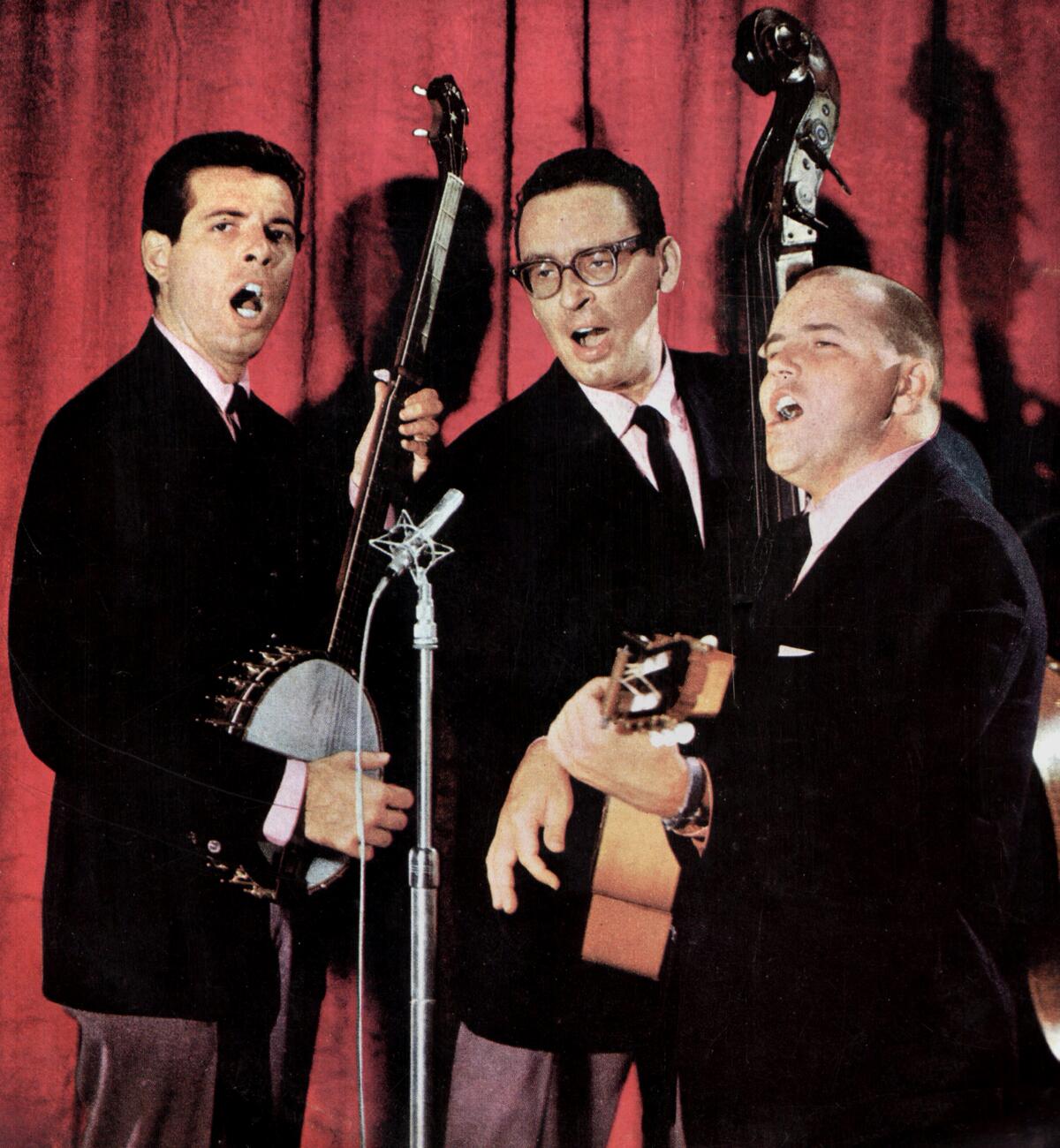Alex Hassilev, last original member of the â60s folk trio the Limeliters, dies at 91

Alex Hassilev, the singing, songwriting, guitar and banjo virtuoso who was the last surviving original member of 1960s folk trio the Limeliters, died of cancer April 21 at Providence St. Joseph Medical Center in Burbank. He was 91.
Hassilev was the youngest member of the Limeliters, whose other original members were bassist and comic spokesman Lou Gottlieb (1923-1996) and star tenor Glenn Yarbrough (1930-2016). The band was second only to the Kingston Trio in its popularity during the peak years of the American urban folk music boom of the late 1950s and early â60s.
After becoming a hit act at San Franciscoâs fabled hungry i nightclub only two months after their formation in 1959, the Limeliters became an inescapable presence in mass media. They recorded 13 albums, appeared on television and toured as many as 310 days out of the year. Their most enduring album, âThrough Childrenâs Eyes,â was popular among generations of children and their parents.
Hassilevâs powerful chops on banjo and guitar gave the groupâs music much of its rhythmic drive, and his expertise in foreign languages â particularly in French, Portuguese and Russian â made it possible to add songs from outside American folk music to the groupâs repertoire. Tall, debonair and handsome, Hassilev also was the sex symbol of the trio.
Dickey Betts, a founding member and guitarist for the Allman Brothers Band, died Thursday of cancer and COPD, his family announced. The musician was 80.
Hassilev was born in Paris on July 11, 1932, to Russian emigrĂŠ parents Leonide and Tamara Hassilev. Like his colleagues in the Limeliters, he was an only child â and to one another the three musicians were probably the closest thing to brothers they ever had.
The Hassilevs were Jewish and left Paris for New York City in 1939 ahead of the Nazi occupation of France during World War II, and in Manhattan Leonide Hassilev continued his career as a civil engineer specializing in hydroelectric projects. Hassilev had showed early brilliance as a child, picking up new languages with ease and eventually speaking six fluently. When he came to America, he found that he was ahead of his classmates.
âI breezed through school, except that I was lousy at shop,â he said in one of the interviews that eventually resulted in my recent biography of the bandâs core trio, âMakinâ a Joyful Noise: The Lives and Times of the (Slightly) Fabulous Limeliters.â âI was good at everything in those days because I had this tremendous background from my European days, where they teach at a higher level.â
Hassilevâs musical background was mainly in the classical field, although he knew some Russian folk songs that his parents brought over as well as some Brazilian and French songs. He said that he didnât discover American folk music until his early 20s, when he was stationed in England after being drafted into the Army.
A chance listening to the Weaversâ recording of âKisses Sweeter Than Wineâ on the radio electrified him.
âI thought, goddamn, thatâs the greatest thing I ever heard, and it made such an impression on me that it kindled my interest in American folk music,â he said during an interview in 1989. âAt the time, I didnât know any songs in English.â
Taylor Swift released the 16-track âTortured Poets Departmentâ at the stroke of midnight on Friday â and surprised fans with 15 more songs two hours later. Here are the best songs from the double album.
Hassilev attended Harvard for a year but, dissatisfied with the Ivy League atmosphere, he transferred to the University of Chicago with the idea of going into the diplomatic corps. The lure of the theater eventually won out, and he enrolled at New Yorkâs Neighborhood Playhouse, where he studied with Sanford Meisner and Martha Graham. Upon graduation, he looked for work as an actor while participating in the folk music scene in Greenwich Village, where he met Yarbrough at a party.
Eventually, Yarbrough asked Hassilev to join him as a co-owner and performer at an Aspen, Colo., nightclub called the Limelite, forming a trio with singer-actor Marilyn Child. The two men also sang together at a small club in Hollywood called the Cosmo Alley, and it was there in 1959 that Gottlieb â then trying to sell arrangements to the Kingston Trio â heard and liked their sound.
At first Gottlieb simply wanted them to help him make demo tapes for the Kingstons to learn songs, but Hassilev and Yarbrough countered with an offer to work up an act of their own. Gottlieb agreed and got hungry i owner Enrico Banducci to offer the new trio of Gottlieb, Hassilev and Yarbrough a gig there, sight unseen and unheard.
Banducciâs gamble paid off big-time. Within days after their opening, the Limeliters were selling out the club and were besieged with offers from major record companies eager to cash in on the folk boom. After making a modestly selling album for Elektra, the group signed with RCA Victor. Their first RCA album, âTonight: In Person,â recorded live at the Ash Grove in Los Angeles, rose to No. 5 on the charts. Commercials for Folgerâs coffee, L&M cigarettes, Ford Motor Co. and Coca-Cola followed, which irked folk purists but gave the group immense exposure.
The three Limeliters were an intelligent and volatile set of personalities armed with formidable debating skills, and they regularly argued about repertoire, money and even the clothes they wore onstage.
âThey were breaking up every day they were in existence,â their then-manager Ken Kragen recalled. Their touring schedule increased the tensions, and a December 1962 plane crash near Provo, Utah â from which they were lucky to survive with only minor injuries â contributed to their first breakup. Yarbrough left the group in July 1963 to go solo; Hassilev and Gottlieb continued for two years as a recording act to fulfill their RCA Victor contract, with Ernie Sheldon replacing Yarbrough.
Morgan Wallen, Hardy and the Beach Boys with John Stamos brought the heat for the final day of the 2024 Stagecoach country music festival.
Uncertain as to what to do next, Hassilev tried a solo singing career but gave up after two unsuccessful albums and an aborted nightclub gig. He turned to acting, landing a prominent role as a Russian-speaking sailor in the Norman Jewison Cold War comedy âThe Russians Are Coming the Russians Are Coming,â as well as a guest shot on TVâs âGet Smart.â He became interested in producing records, founding an early home recording studio that at its peak operated around the clock in his basement in West Hollywood, near the Sunset Strip.
His studio was one of the first to have a Moog synthesizer â well before the Beatles, the Monkees and other pop bands discovered the instrument. He and Mort Garson used the Moog to help create a moderate-sized hit album, âThe Zodiac: Cosmic Sounds.â As a producer, Hassilev also managed to get Gottlieb and Yarbrough to record a period-pop-flavored Limeliters reunion album, âTime to Gather Seeds,â in 1968.
Eventually, Hassilev tired of running the studio and wound down his schedule. When the chance came to reunite the Limeliters as a part-time touring act in 1972, Hassilev, who now solely owned the rights to the groupâs name, jumped at the chance. The old vocal chemistry was still there; the show drew highly positive reviews and big crowds. But the folk boom had long since deflated, and the Limeliters never could attract the same level of attention from record companies.
Eventually Yarbrough grew restless, leaving the trio in 1977 and returning in 1980, only to depart again after a few months of touring in which the old group tensions arose again. Hassilev, now thoroughly in charge, kept the Limeliters going, replacing Yarbrough with tenors Red Grammer in the 1980s and Rick Dougherty in the 1990s, experimenting with country music before doubling back to their folk base.
When Gottlieb died suddenly in 1996, Hassilev replaced him with Bill Zorn. That edition of the Limeliters lasted until 2002, when Hassilev developed bladder cancer and had to leave the road. When he recovered, a legal dispute blew apart that edition of the trio, but Hassilev kept the Limeliters going, teaming up with Andy Corwin and Mack Bailey.
Hassilev retired in 2006, leaving the leadership of the touring Limeliters to Corwin while still owning the groupâs name. Under Corwin, the Limeliters, with various changes in personnel, remain active to this day.
In retirement, Hassilev moved from West Hollywood to North Hollywood, where he spent hours and hours editing and resequencing prospective albums of his work alone and with the trio, as well as doting upon his five dogs. Though increasingly physically immobile in his last decade, Hassilev remained sharp mentally, growing conservative in his politics and ready to debate his liberal friends. Even at 90, he could dominate a room with his bass-baritone voice and a warmth that could smooth over tension.
Hassilevâs survivors include his second wife, Gladys; his son from his first marriage to Ginger Stagner, David; two grandchildren; and three great-grandchildren.
More to Read
The biggest entertainment stories
Get our big stories about Hollywood, film, television, music, arts, culture and more right in your inbox as soon as they publish.
You may occasionally receive promotional content from the Los Angeles Times.











